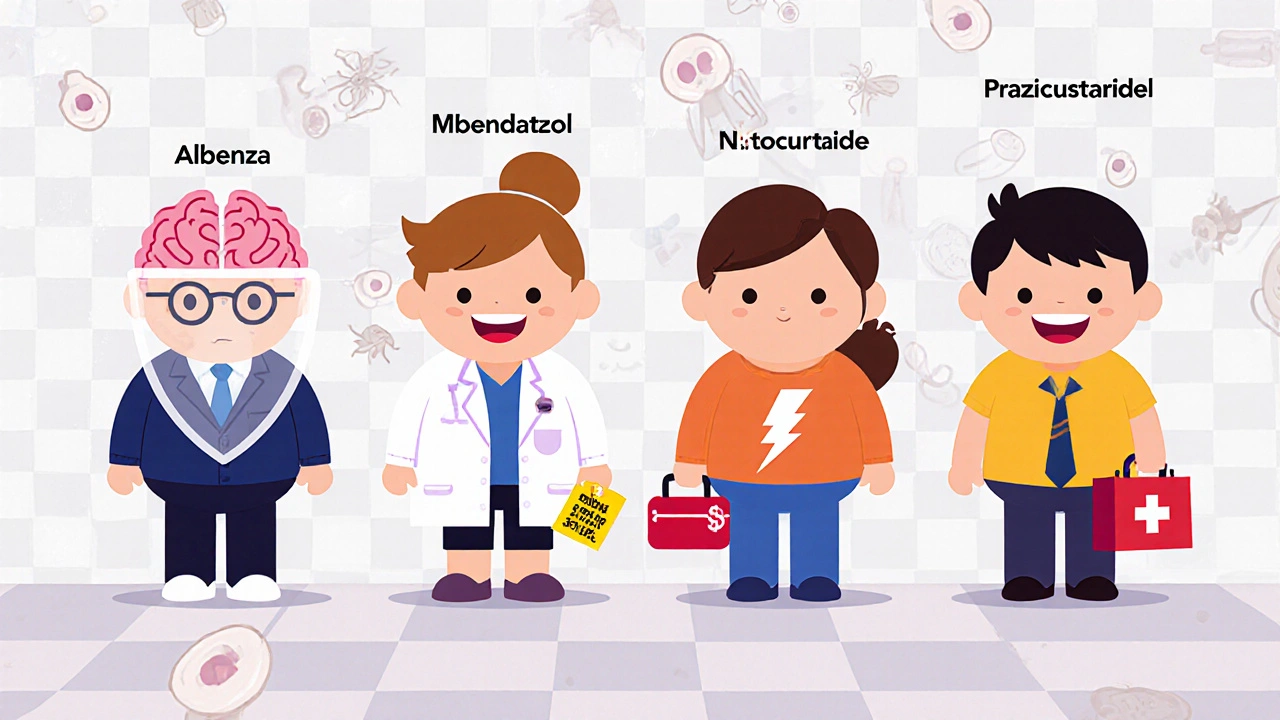Albenza is a powerful drug used to fight parasitic worms like tapeworms, roundworms, and other helminths. But it’s not the only option. If you’ve been prescribed Albenza-or are considering it-you’re probably wondering: are there better, cheaper, or safer alternatives? The answer isn’t simple. It depends on the type of infection, your health history, and where you live. This guide breaks down the real differences between Albenza and its most common alternatives, so you know exactly what to ask your doctor.
What Albenza Actually Does
Albenza contains albendazole, a drug that stops parasites from absorbing glucose-their main source of energy. Without it, the worms starve and die. It’s used for infections like neurocysticercosis (tapeworm larvae in the brain), hydatid disease (from dog tapeworms), and pinworms. The standard dose is 400 mg once or twice daily, taken with food to boost absorption. For some infections, treatment lasts 8-30 days.
It’s not a quick fix. You might not feel better for days or even weeks. Side effects include nausea, dizziness, and temporary liver enzyme changes. Rarely, it can cause bone marrow suppression. That’s why blood tests are often needed during treatment.
Alternative 1: Mebendazole (Vermox, Emverm)
Mebendazole is the most common alternative to Albenza. It works the same way-blocking glucose uptake in worms-but it’s older and less potent. It’s widely used for pinworms, roundworms, and hookworms. In many countries, it’s available over the counter.
Here’s how they stack up:
| Feature | Albenza (Albendazole) | Mebendazole |
|---|---|---|
| Effectiveness against tapeworms | High | Moderate to low |
| Effectiveness against cysticercosis | Yes | No |
| Dosing frequency | Once or twice daily | Twice daily |
| Food requirement | Needs fatty food | Less critical |
| Availability | Prescription only | OTC in many countries |
| Cost (US, 30-day supply) | $200-$400 | $10-$30 |
For simple pinworm infections, mebendazole is often the first choice. But if you have a brain infection from tapeworm larvae, mebendazole won’t cut it. Albenza is the only FDA-approved option for that.
Alternative 2: Praziquantel (Biltricide)
Praziquantel is the go-to for flatworms-especially schistosomiasis (blood flukes) and liver flukes. It’s also used for tapeworms in the intestines. Unlike Albenza, it paralyzes the worm, making it easier for your body to flush it out.
It’s not a direct replacement for Albenza, but in some cases, it’s preferred. For example:
- If you have a pork tapeworm in your gut, praziquantel clears it faster than Albenza.
- If you’re in Southeast Asia or Africa and have schistosomiasis, praziquantel is the standard treatment.
- For neurocysticercosis, Albenza is still preferred because praziquantel can cause dangerous brain swelling during treatment.
Praziquantel usually requires just one or two doses. Side effects include dizziness, headache, and abdominal pain-but they’re short-lived. It’s also cheaper than Albenza in most places.
Alternative 3: Nitazoxanide (Alinia)
Nitazoxanide is newer and used mainly for protozoan infections like giardia and cryptosporidium. But it’s also active against some worms, including roundworms and hookworms. It’s not FDA-approved for tapeworms, but some doctors use it off-label for mild cases.
It’s taken twice daily for 3 days. Side effects are mild: stomach upset, discolored urine. It’s more expensive than mebendazole but less than Albenza. One advantage? It doesn’t need fatty food to work. That makes it easier for kids or people with nausea.
But here’s the catch: there’s no strong evidence it works as well as Albenza for brain or tissue-invading worms. Don’t use it as a substitute for serious infections.

Alternative 4: Ivermectin
Ivermectin is famous for treating river blindness and scabies. It’s also used for strongyloidiasis and some roundworms. But it doesn’t touch tapeworms or cysticercosis. So if your infection involves pork or dog tapeworms, ivermectin won’t help.
It’s a single oral dose, usually 200 mcg/kg. It’s cheap and widely used in global health programs. In some countries, it’s even sold without a prescription. But in the U.S., it’s strictly prescription-only.
Side effects can include dizziness, nausea, and muscle pain. Rarely, it causes dangerous reactions in people with high levels of certain parasites (like loiasis), because dying worms trigger inflammation.
When to Choose Albenza Over Others
Albenza isn’t always the best-but it’s often the only choice. Here’s when it’s non-negotiable:
- Neurocysticercosis (tapeworm larvae in the brain)
- Hydatid disease (echinococcus cysts in liver or lungs)
- Severe or recurring pinworm infections that don’t respond to mebendazole
- When other drugs aren’t available or have failed
Doctors often combine Albenza with steroids to reduce brain swelling in neurocysticercosis. That’s a sign it’s being used for a serious condition-not a simple stomach bug.
When Alternatives Are Better
Albenza has drawbacks: cost, side effects, and strict dosing rules. Here’s when you’re better off with something else:
- Simple pinworms? Use mebendazole. It’s cheaper, safe, and effective.
- Intestinal tapeworm? Praziquantel works faster and needs fewer doses.
- Giardia or cryptosporidium? Nitazoxanide is the standard.
- Strongyloides or scabies? Ivermectin is the clear winner.
Don’t assume stronger = better. Sometimes, a simple 3-day course of mebendazole clears your infection without needing a $300 prescription.

What Your Doctor Won’t Tell You
Many doctors prescribe Albenza because it’s the most “comprehensive” drug. But that doesn’t mean it’s right for you. Here’s what’s often overlooked:
- Albenza can interact with theophylline, dexamethasone, and cimetidine. Tell your doctor about every medication you take.
- Pregnant women shouldn’t take Albenza. It can harm the fetus. Use mebendazole instead if needed.
- Albenza isn’t approved for children under 1 year. For young kids, mebendazole or nitazoxanide are safer.
- Some infections require surgery, not drugs. If you have a large liver cyst from echinococcus, you might need drainage before taking Albenza.
Also, many people think one dose fixes everything. But for tapeworms in the brain, you might need weeks of treatment. Skipping doses increases the risk of drug resistance.
What to Do Next
Don’t switch drugs on your own. But do ask your doctor these questions:
- What specific parasite am I dealing with?
- Is Albenza the only option, or are there cheaper, safer alternatives?
- Will I need blood tests or imaging during treatment?
- What happens if this doesn’t work?
If you’re in a country where Albenza is expensive or hard to get, ask about generic albendazole. It’s the same drug, often sold for under $20. Many pharmacies in Australia, India, and Southeast Asia carry it.
And if you’re treating a child, always confirm the dose. Kids need lower amounts based on weight-not adult dosing.
Frequently Asked Questions
Can I take Albenza without a prescription?
No. Albenza is a prescription-only medication in the U.S., Australia, and most developed countries. Even though albendazole is available as a generic in some places, you still need a doctor’s approval. Self-treating parasitic infections can be dangerous, especially if the parasite has moved to your brain or liver.
How long does it take for Albenza to work?
You won’t feel better right away. For intestinal worms, eggs and larvae may start dying within days, but symptoms like bloating or fatigue can last up to two weeks. For brain or tissue infections, treatment lasts weeks or months. The drug kills the worms slowly-so patience is key.
Is albendazole the same as Albenza?
Yes. Albenza is the brand name. Albendazole is the generic active ingredient. Generic versions work just as well and cost a fraction of the price. Many pharmacies stock generic albendazole, especially outside the U.S.
Can I drink alcohol while taking Albenza?
It’s not recommended. Alcohol can increase the risk of liver damage, especially since Albenza already affects liver enzymes. Even moderate drinking should be avoided during treatment. Wait at least a week after finishing the course before drinking.
What if Albenza doesn’t work?
If symptoms persist after completing the full course, your doctor may order a stool test, blood test, or imaging (like a CT scan). You might need a different drug-like praziquantel-or a longer course. In rare cases, surgery is needed to remove cysts or worms that didn’t respond to medication.
Are there natural alternatives to Albenza?
No proven natural alternatives exist. Garlic, pumpkin seeds, or wormwood supplements are often marketed as “natural dewormers,” but there’s no solid clinical evidence they kill tapeworms or cysticercosis. Relying on them can delay proper treatment and lead to serious complications. Always use FDA-approved or WHO-recommended medications for parasitic infections.


Herbert Scheffknecht
Look, we all want the magic bullet, but medicine ain't a video game where you just pick the strongest weapon. Albenza’s like a tank-overkill for a bike thief, but necessary when the whole block’s got zombies. The real question isn’t ‘which drug?’ it’s ‘which parasite?’ and most docs don’t even test before prescribing. We treat symptoms, not causes. That’s the system.
And don’t get me started on ‘natural alternatives.’ If your solution involves garlic and yoga, you’re not healing-you’re delaying the inevitable. Parasites don’t care about your aura.
Jessica Engelhardt
Albenza is just Big Pharma’s way of keeping you hooked. Mebendazole’s been around since the 70s and works fine. Why pay $300 when you can get the same active ingredient for $15? They’re just milking the fear of worms to sell you a luxury pill. Plus, who even gets tapeworms in 2024? Probably ate a bad taco or something. Just wash your hands and move on.
Also, I heard the FDA gets kickbacks from drug companies. Just saying.
Martin Rodrigue
While the comparative efficacy table presented is largely accurate, it fails to account for pharmacokinetic variability across populations. Albendazole’s bioavailability is significantly enhanced by lipid-rich meals, a factor often overlooked in low-resource settings where dietary fat intake may be suboptimal. Furthermore, the cost differential cited does not reflect the total economic burden, including required monitoring labs and potential hospitalization for adverse events. A cost-effectiveness analysis would provide a more nuanced perspective.
Sherri Naslund
Okay but like… why does Albenza even exist? Like, I get that parasites are bad, but why do we need a $400 pill when mebendazole’s been doing the job for decades? And why is it prescription only? Who decided worms are too dangerous to treat without a PhD? I think it’s all a scam. They want us dependent. Plus, I read somewhere that albendazole was originally developed by the military to control soldiers’ guts in the jungle. Like… are we still in a war? 🤔
Also, I took it once and my pee turned purple. Not a joke. That’s not normal. They’re hiding stuff.
Ashley Miller
Albenza? More like Alben-ZOMBIE. You know what they don’t tell you? That drug doesn’t kill the worms-it just puts them in a coma so your body can’t fight back. Then, when you stop taking it, they wake up… and they’re angrier. That’s why people relapse. The FDA knows this. They just don’t want you to panic. Also, the liver enzyme spikes? That’s not a side effect. That’s your body screaming for help. They call it ‘transient’ like it’s a bad mood. Wake up.
And the ‘generic’ version? Same thing. Just repackaged by a factory in Mumbai that also makes fake iPhone chargers. 🤷♀️
Lauren Hale
Really appreciate this breakdown. So many people panic and just demand Albenza without understanding what they’re treating. I’ve seen patients on both ends-some with mild pinworms on $300 prescriptions, others with brain cysts getting mebendazole because their doc didn’t test properly.
Key thing: if you’re in the US and cost is an issue, ask for generic albendazole. It’s literally the same molecule. Also, if you’re pregnant or have kids, always double-check the dose. I’ve seen toddlers get adult doses by accident. That’s not a typo-that’s a tragedy waiting to happen.
And no, pumpkin seeds won’t save you. I wish they would. But science says no. Stick to the meds. Your gut will thank you.
Greg Knight
Hey, I know this stuff can feel overwhelming, but you’re not alone. I’ve been through this with my sister-neurocysticercosis, brain scans, the whole thing. Albenza was brutal. Nausea, headaches, she felt like she was dying for weeks. But here’s the thing: it worked. She’s fine now.
Don’t let the cost scare you off. Talk to your doctor about patient assistance programs. Some pharma companies give it free if you qualify. And if you’re on a tight budget, generic albendazole is legit-same stuff, different label. I’ve seen people get it from Canada for $18.
And yeah, praziquantel’s faster for intestinal worms, but if it’s in your brain? Albenza’s your only shot. Don’t gamble with that. Your brain’s not a place to experiment.
You got this. One pill at a time.
rachna jafri
Albenza? Pfft. In India we have a guy who sells deworming pills from a cart outside the temple. ₹50 for a full course. No prescription. No lab. No drama. And people get better. Why do Americans pay $400 for a pill that’s sold on the street in Delhi? Because your system is broken. Pharma owns your doctors. Your government owns your fear.
Also, I’ve seen kids with worms eat neem leaves for a week. No Albenza. No side effects. And they’re fine. You think science is the only truth? Maybe you’re just too scared to look at what’s been done for centuries.
They want you dependent. Don’t be their customer.
darnell hunter
The efficacy data presented is statistically sound. However, the omission of pharmacogenomic variability in albendazole metabolism-particularly CYP3A4 and CYP2C19 polymorphisms-is a significant limitation in clinical applicability. Furthermore, the assertion that mebendazole is ‘ineffective’ against neurocysticercosis is supported by clinical trials, but the absence of comparative pharmacokinetic modeling in CNS penetration renders the conclusion incomplete. A meta-analysis of randomized controlled trials would be advisable prior to therapeutic recommendation.
Ankita Sinha
I’m from India and I’ve seen so many people get treated with albendazole here-it’s just part of life. My uncle had a cyst in his liver, took albendazole for a month, and now he’s fine. No hospital, no fancy scans. Just pills and rest.
But honestly? The biggest problem isn’t the drug. It’s that people wait too long. They think ‘it’ll go away’ or ‘it’s just gas.’ By the time they go to the doctor, it’s already spread. Don’t be that person. If you’ve got bloating, fatigue, weird poop for more than a week? Get tested.
And yes, generic albendazole works. I buy it from the local pharmacy. Same as Albenza. Just cheaper. No need to overpay.
Kenneth Meyer
There’s a deeper layer here beyond drug comparisons. We treat parasites like invaders, like enemies to be annihilated. But what if they’re not? What if they’re the result of a system out of balance-poor sanitation, industrial food, chronic stress? We kill the worm, but we don’t fix the soil it grew in.
Albenza saves lives, no doubt. But it’s a bandage on a broken spine. We need public health. Clean water. Education. Not just better pills.
Still… I’ll take the pill if I have to. Just don’t call it healing.
Donald Sanchez
bro i took albenza last year and my pee turned green?? like literal neon green?? and i was like ‘is this a drug or a glowstick?’ 🤯 also i think the docs just wanna make money tbh. i got the generic for $22 from canada and it felt the same. why pay 400 bucks for a pill that makes you feel like a zombie?? also i drank beer once during treatment and my liver screamed. not worth it. 🤡
Abdula'aziz Muhammad Nasir
In Nigeria, we use albendazole routinely for mass deworming programs in schools. It’s safe, effective, and cheap. The challenge isn’t the drug-it’s access. Many children never get treated because clinics are far away or supplies run out.
Albenza is the brand. Albendazole is the medicine. The science doesn’t care what you call it. What matters is that the right person gets the right dose at the right time.
And please-don’t rely on ‘natural remedies.’ Worms don’t care about your crystals. They care about your intestines. Treat them with science, not superstition.